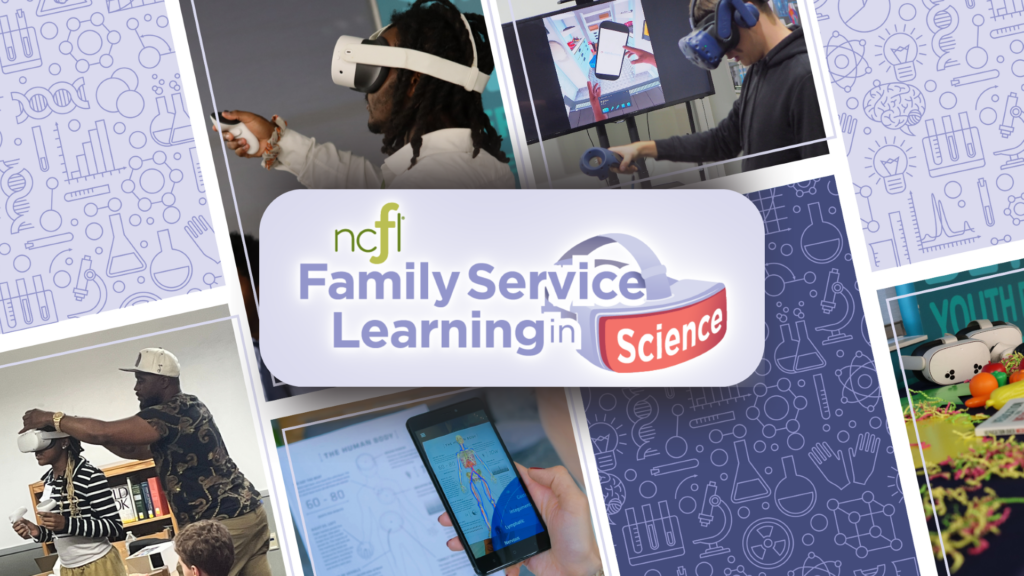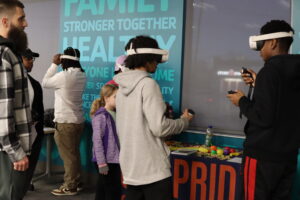Deepening family engagement through immersive learning: Why it matters now
Editor’s Note: This week, NCFL’s National Director of Education Strategy & Innovation, Cassandra McGraw, discusses how immersive learning strategies can jumpstart family engagement while supporting key curricular goals.
At the National Center for Families Learning (NCFL), we believe that learning is at its most powerful when it’s rooted in a shared partnership among parenting adults, educators, and youth. Whether in a classroom, library, living room, or community center, the most meaningful learning often emerges from moments when learners, their families, and practitioners work together to solve community challenges that matter most to them. That belief continues to guide how we think about family engagement—not as an “outcome,” but as a key strategy for building authentic family–school relational trust, deepening learning, and increasing learning outcomes for students.
In recent years, this belief has taken new shape through our work in immersive learning. As we consider the future of education, especially for secondary students, the need to reimagine what learning looks and feels like has never been greater. Middle and high schoolers across the country are asking for relevance, for relationships, and for the chance to make a real impact. Families, too, want to be engaged in ways that honor their expertise and their role in their children’s development. Immersive learning sits at the intersection of those complementary needs.

Family Service Learning in Science
Immersive learning is more than a trend. As defined by the Center for Engaged Learning, it is an overarching, real-world approach to teaching and learning that engages learners deeply through authentic, experiential, and often community-based environments; fostering a deepened learning experience, heightened connection, and increased engagement.
With our Family Service Learning in Science (FSLsci) core program, NCFL has embraced immersive learning as a powerful strategy to bring students, families, and communities together in meaningful ways through a hands-on approach. By weaving together immersive practices, through the use of virtual and augmented reality and with authentic family engagement and multigenerational learning, we are creating learning environments where young people thrive alongside their families.

Whether investigating environmental conditions or co-designing community-based solutions, students, families, and educators share power and engage in work that connects learning to their school’s curriculum and their own lived experiences. These programs go beyond traditional classroom boundaries, transforming education into something personal, purposeful, and public. The result is not only stronger academic outcomes but deeper family bonds, greater confidence in learning, and a renewed sense of agency for both students and their caregivers.
Why It Matters Now
We are at a pivotal moment in education. As noted by Attendance Works, the rapid increase in chronic absenteeism demands more than new attendance policies; it calls for new ways of engaging students and families. For too many secondary students, school still feels disconnected from their lived experience. For too many families, engagement is limited to one-directional communication or compliance-based involvement. NCFL President & CEO, Dr. Felicia C. Smith, wrote about this topic in a recent blog post, noting that often secondary schools “only connect with parents when there’s a problem, and parents only reach out to schools when they have concerns.”
In our work across the country, we’ve heard directly from families and educators. Families have shared that they often feel left out of their children’s academic journeys. Many described receiving inconsistent updates, limited guidance on how to support learning at home, and few resources in their primary language. While families want to engage in academic partnership, they struggle to navigate scattered digital tools and unclear expectations. At the same time, educators expressed frustration with a lack of response to outreach and noted barriers such as limited time and the need for more school-based support to engage more meaningfully with students and parenting adults. Both families and educators expressed a desire to partner, but shared that current systems can sometimes fall short of creating the conditions for meaningful engagement to occur.
This is why NCFL’s integration of immersive learning and multigenerational engagement is so critical right now. Immersive learning offers families and students the opportunity to work side by side on meaningful, community-connected projects that make school feel relevant and inclusive. Rather than seeing family engagement as a separate activity, this approach embeds it directly into the learning process to drive academic outcomes. Students feel seen, families feel valued, and educators have the chance to see families as trusted partners in supporting youth. At a time when disconnection threatens student success, multigenerational immersive learning grounds skill-building in relationships, community, and collaboration—all conditions that students and families need to thrive.
What’s Next?
At NCFL, we’re proud to share our latest national resource, Leveraging Family Engagement through Immersive Technology for Deeper Learning. This new digital playbook provides a field-tested collection of strategies, resources, and promising practices from our FSLsci program. The guide is designed to be adapted and scaled by educators, school leaders, and community organizations who want to engage families and students in deeper learning.
If you’re exploring how to engage families and youth in ways that feel authentic, challenging, and joyful, we invite you to explore the playbook. And if you’re curious about what it looks like in action, take a look at our new video that highlights the latest iteration of FSLsci with families and educators from Jefferson County Public Schools in Louisville, KY. You’ll see what’s possible when we stop asking families to come to school and instead invite them to shape it.
The future of education depends on our willingness to think differently about who learning is for, how it happens, and where it begins. At NCFL, we believe it begins with families—every generation, every background, and every zip code. Immersive learning is one of the many ways we’re working to make that belief a reality. Learn more about our family engagement work across the country by attending the national 2025 Families Learning Conference, happening this November in Charlotte, North Carolina. Or reach out now to learn how you can bring this NCFL core programming to your district or community.
Let’s keep building together.
About the Author

Cassandra McGraw
National Director, Education Strategy & Innovation
Cassandra McGraw is a people-centered national thought leader with over 15 years of experience in education, driven by a deep belief that all families deserve access to shared power and leadership within their communities to foster multigenerational abundance and prosperity. A lifelong learner and dedicated educator, Cassandra has cultivated a career grounded in the conviction that authentic family engagement is essential to student success and community wellbeing.
Her career spans roles as a middle school teacher, nonprofit leader, and strategic advisor to school and district leadership. Throughout her work, she has led systems-level efforts to operationalize effective family engagement policies and practices– centered on building relational trust and improving outcomes for families furthest from opportunity.
In her current role as National Director of Education Strategy and Innovation at the National Center for Families Learning (NCFL), Cassandra leads the development and execution of high-impact, multigenerational educational programming across the birth-to-adulthood continuum. Her work at NCFL centers on designing innovative systems of support that bridge families, schools, and communities to accelerate learning and expand opportunities.
Cassandra holds a Master of Education in School Leadership from the Harvard Graduate School of Education and a Bachelor of Science in Elementary Education, Reading, and English Language Learning from the University of Central Florida.